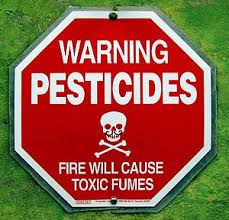 Now, this is wild, but it makes sense. A former executive of the giant pesticide company Monsanto started a consulting firm v-Fluence, which secretly profiled critics of pesticides and GMOs (genetically modified organisms). All to downplay the dangers of pesticides, to discredit environmentalists, and to undermine any anti-pesticide legislation in North America, Europe, and Africa.
Now, this is wild, but it makes sense. A former executive of the giant pesticide company Monsanto started a consulting firm v-Fluence, which secretly profiled critics of pesticides and GMOs (genetically modified organisms). All to downplay the dangers of pesticides, to discredit environmentalists, and to undermine any anti-pesticide legislation in North America, Europe, and Africa.
And...drumroll... which was partly paid for by US taxpayer money. Yes, over $400,000. US taxpayers partly funded this covert campaign for services done by v-Fluence, such as "enhanced monitoring of critics" of "modern agriculture approaches" (genetically modified crops, conventional pesticides).
What? How can this be? For years now, Big Business (pesticide industry) has had a huge influence over safety rules, research, and studies deemed "acceptable" at the EPA and other US government agencies. So v-Fluence profiled and attacked in-depth any critics of pesticides or a "threat" to their interests. Even the writers and food critics Michael Pollan and Mark Bittman - due to their support for organic farming and concerns with industrial farming.
Journalists from a number of groups, including the non-profit newsroom The Lighthouse and The Guardian, investigated the "private social network" called Bonus Eventus. This social network was set up by v-Fluence to counter resistance to pesticides and genetically modified (GM) crops, and to also denigrate organic and other alternative farming methods. [Organic farming does not use conventional pesticides, thus it would result in Monsanto and other pesticide companies losing $$.]
 More than 30 current US government officials are on the membership list, most of whom are from the US Department of Agriculture (USDA). At the least, this is a conflict of interest.
More than 30 current US government officials are on the membership list, most of whom are from the US Department of Agriculture (USDA). At the least, this is a conflict of interest.
By the way, the problem with genetically modified foods is not the concept of genetic modification, but that it is used in a way that dramatically increases the amount of pesticides used. For example, growing Round-up Ready Corn (which means it is resistant to glyphosate) means that more Roundup is being used on the GMO corn than ever before, and this means consumers ultimately ingest more pesticides than ever before when eating products with corn in it. Such as cereal.
Excerpts from The Lighthouse: Poison PR
Paraquat is among the most toxic agricultural chemicals ever produced. It’s banned in the European Union, where the consequences of its use are still being felt, but in parts of the world it’s still being sold. This is made possible, in part, by an influence machine that works to suppress opposition to an $78 billion global industry.
A year-long investigation managed to penetrate a PR operation that casts those who raise the alarm, from pesticide critics to environmental scientists or sustainability campaigners, as an anti-science “protest industry,” and used US government money to do so.
The US-based PR firm, v-Fluence, built profiles on hundreds of scientists, campaigners and writers, whilst coordinating with government officials, to counter global resistance to pesticides. These profiles are published on a private social network, which grants privileged entry to 1,000 people. The network’s membership roster is a who’s-who of the agrochemical industry and its friends, featuring executives from some of the world’s largest pesticide companies alongside government officials from multiple countries.
"We received a tip that the US government had been involved in an attempt to sabotage a scientific conference in Nairobi, Kenya, that showcased sustainable solutions to pesticides. FOIA requests revealed extensive correspondence between US civil servants, a Kenyan NGO, pesticide executive and a company, v-Fluence, about how to subvert the event. How was everyone on this email chain connected? We dug into the rather obscure v-Fluence to learn more.
A mix of money-trails analysis and public spending record searches surfaced contracts by USAID, granted to v-Fluence, to construct a “private social network”. By looking through court records, we found a recent case accusing the firm of working with Syngenta to hide the risks of Paraquat."
Excerpts from The Guardian: Revealed: the US government-funded ‘private social network’ attacking pesticide critics
In 2017, two United Nations experts called for a treaty to strictly regulate dangerous pesticides, which they said were a “global human rights concern”, citing scientific research showing pesticides can cause cancers, Parkinson’s disease, Alzheimer’s and other health problems.
Publicly, the pesticide industry’s lead trade association dubbed the recommendations “unfounded and sensational assertions”. In private, industry advocates have gone further. Derogatory profiles of the two UN experts, Hilal Elver and Baskut Tuncak, are hosted on an online private portal for pesticide company employees and a range of influential allies.
Members can access a wide range of personal information about hundreds of individuals from around the world deemed a threat to industry interests, including the US food writers Michael Pollan and Mark Bittman, the Indian environmentalist Vandana Shiva and the Nigerian activist Nnimmo Bassey. Many profiles include personal details such as the names of family members, phone numbers, home addresses and even house values.
The profiling is part of an effort – that was financed, in part, by US taxpayer dollars – to downplay pesticide dangers, discredit opponents and undermine international policymaking, according to court records, emails and other documents obtained by the non-profit newsroom Lighthouse Reports.
It collaborated with the Guardian, the New Lede, Le Monde, Africa Uncensored, the Australian Broadcasting Corporation and other international media partners on the publication of this investigation.
Mounting scientific evidence has linked some pesticides to a host of health risks, including leukemia, Parkinson’s, and cancers of the bladder, colon, bone marrow, lung, blood cells and pancreas, as well as reproductive problems, learning disorders and problems of the immune system. The concerns about various documented health impacts have led multiple countries to ban or otherwise restrict several types of pesticides.
v-Fluence and Byrne personally have developed extensive connections with government officials who he has advised on attempts to introduce pesticides regulations outside the US.
A key region for v-Fluence work has been Africa. According to the government contracts, v-Fluence was to work with USAid’s program to elevate pro-GM crop messaging in Africa and counter GM opponents. It focused in particular on Kenya.
Opposition to GM crops and pesticides has been strong in Kenya, where approximately 40% of the population works in agriculture. Kenyan farm workers use many pesticides that are banned in Europe and are routinely exposed to these products, often without adequate protective equipment or access to healthcare.
A lawsuit naming Byrne and v-Fluence as co-defendants with Syngenta was filed in Missouri by a woman and her son, Donna and James Evitts, who both suffer from Parkinson’s disease and claim it is linked to decades of use of the herbicide paraquat on their family farm.
The suit contains specific allegations about the role of v-Fluence in hiding the dangers of paraquat, which has been banned in the EU, the UK, China and dozens of other countries, though not in the US. There have been several studies linking paraquat to Parkinson’s; one of the most recent was published in February in the peer-reviewed International Journal of Epidemiology.
The Evitts lawsuit is one of thousands of cases brought by people alleging they developed Parkinson’s from using Syngenta’s paraquat products. Originally filed in Missouri, the case is pending in the US district court for the southern district of Illinois, where thousands of paraquat cases have been consolidated. The first US paraquat trial is scheduled to get under way in February.
The lawsuit cites sealed court records in alleging that Syngenta signed a contract with v-Fluence in 2002 to help the company deal with negative information coming to light about its paraquat herbicides. The lawsuit alleges v-Fluence went on to help Syngenta create false or misleading online content that was “Paraquat-friendly”, used search engine optimization to suppress negative information about paraquat in internet searches, and investigated the social media pages of victims who reported injuries to Syngenta’s crisis hotline.
The New Lede and the Guardian have previously revealed that Syngenta’s internal research found adverse effects of paraquat on brain tissue decades ago but the company withheld that information from regulators, instead working to discredit independent science linking the chemical to brain disease and developing a “Swat team” to counter critics.
